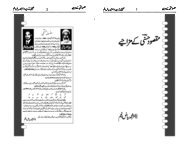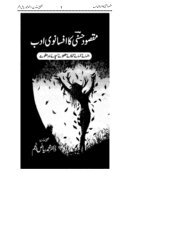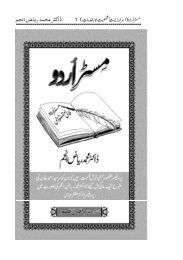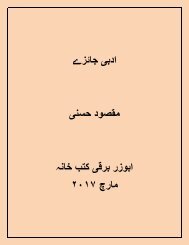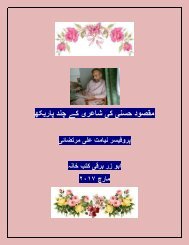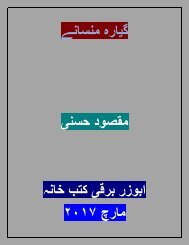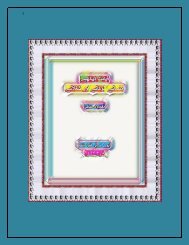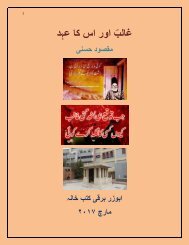Japani_ki_lisaniyati_Nazam_or_bhol_chal
Create successful ePaper yourself
Turn your PDF publications into a flip-book with our unique Google optimized e-Paper software.
JPANI KA LASANIYATI NAZAAM AUR<br />
BOOL CHAL By Maqssoq Hasni<br />
128<br />
Compiled By: Dr. M. Riaz Anjum<br />
Angraizi ka bhi yahi rovaeya hai Li<strong>ki</strong>n <strong>Japani</strong> main esam ka<br />
baad seft ka estamal hota hai. Maslan<br />
Angraizi The beautiful girl<br />
<strong>Japani</strong> Onna utsukushii<br />
In –na adjectives,<br />
The -na ending is used when the adjective modifies a noun,<br />
but not when it's used as a predicate. The past and<br />
negative cases are f<strong>or</strong>med as they usually are in Japanese.<br />
Thus:<br />
Kireina <strong>ki</strong>mono (pretty <strong>ki</strong>mono)<br />
Kimono wa <strong>ki</strong>rei desu ([your] <strong>ki</strong>mono is pretty)<br />
Kimono wa <strong>ki</strong>rei dewa arimasen <strong>or</strong><br />
Kimono wa <strong>ki</strong>rei ja nai desu ([your] <strong>ki</strong>mono is not pretty)<br />
Kimono wa <strong>ki</strong>rei deshita ([your] <strong>ki</strong>mono was pretty)<br />
Kimono wa <strong>ki</strong>rei dewa arimasendeshita <strong>or</strong><br />
Kimono wa <strong>ki</strong>rei ja nakatta desu ([your] <strong>ki</strong>mono was not<br />
pretty)<br />
(Ja is a contraction of dewa, and is generally m<strong>or</strong>e casual,<br />
so you would be m<strong>or</strong>e likely to use these f<strong>or</strong>ms in speech.<br />
Nai is the plain-f<strong>or</strong>m [familiar/casual] present tense of<br />
arimasen and nakatta is the c<strong>or</strong>responding past-tense f<strong>or</strong>m<br />
f<strong>or</strong> arimasendeshita. Don't sweat all these differences too<br />
much-- you'll learn from context which f<strong>or</strong>m to use when).<br />
But perhaps a clearer way to think of this is that -na is a<br />
f<strong>or</strong>m of the copula da (the casual f<strong>or</strong>m of desu). Kirei da (it<br />
is pretty)<br />
Kirei na yama (a pretty mountain)<br />
Yama ga <strong>ki</strong>rei da (the mountains are pretty)<br />
Yama ga <strong>ki</strong>rei na kuni (a country where the mountains are<br />
pretty)<br />
-I adjectives are different. These are sometimes called<br />
"adjective verbs" because they seem to blend the<br />
properties of adjectives and verbs. This is seen in the fact<br />
that the negative f<strong>or</strong>ms inc<strong>or</strong>p<strong>or</strong>ate the adverbial ending<br />
-ku.<br />
An example of an -i adjective is oishii ("tasty" <strong>or</strong><br />
64<br />
JPANI KA LASANIYATI NAZAAM AUR<br />
BOOL CHAL By Maqssoq Hasni<br />
127<br />
Compiled By: Dr. M. Riaz Anjum<br />
21- Totemo aur taihen bohat aur jo zeyadah na ho (very<br />
aur not very) kay liay estamal <strong>ki</strong>ya jata hai.<br />
22- Koko, soko, asoko aur doko ka jagah, log aur surat <strong>ki</strong><br />
nishan’dahi kay liay estamal kartay hain.<br />
23- <strong>Japani</strong> jumlay main say lafz khatum karna ya barhana<br />
koe achambay <strong>ki</strong> baat nahain. Yahaan tak kah subject bhi<br />
khatam ho sakta hai.<br />
24-Jin object ka ekhtatami par hota hai wo i object kehlatay<br />
hain.<br />
25- Roumaji likhnay kay doo andaz hain. Maslan<br />
ji = zi<br />
e = he<br />
o = wo<br />
shi = si<br />
ou = oo<br />
ou = ô<br />
Jishin (khud’etmadi/self confidence) could technically be<br />
written: Zisin ta’hum Jishin qareeb’tar ho ga.<br />
26-Romaji ko kaisay parha ja’ay:<br />
<strong>Japani</strong> main her hija eak hi lenghth par bola jata hai.<br />
Maslan jab aap lafz aka bolain gay to yah eak second ka<br />
waqt lay ga, .05 a kay liay jab kahitna hi ka kay lay waqt<br />
dar’kar ho ga.<br />
?, ?, ? aur ? dohray miyar kay wawal hain. En <strong>ki</strong> aawaz<br />
sada kay moqablay main lumbi ho gi.<br />
F aawaz sity <strong>ki</strong> se aawaz paida karta hai.<br />
"R" l <strong>ki</strong> mutbadal aawaz hai es liay es kay bolnay main<br />
mukhtalif atwar ekhtayar <strong>ki</strong>ay jatay hain.<br />
27-<strong>Japani</strong> seft ka estamal<br />
Urdu main seft ka ziyada’tar ba’to<strong>or</strong> sabqa estamal hota<br />
hai.<br />
Maslan<br />
Kala aadmi<br />
B<strong>or</strong>i adapt<br />
Zakhmi larka<br />
Nila aasman




